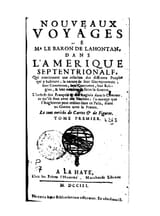Search Results
6/22/2025, 8:11:14 PM
>>17783013
The example the book mentions is between a Wendat chief Kondiaronk, and the French Baron de Lahontan. Their dialogues were published in a book by Lahontan, published in 1703. Kondiaronk had actually visited Paris, and wasn't impressed.
>If you abandoned conceptions of mine and thine, yes, such distinctions between men would dissolve; a levelling equality would then take its place among you as it now does among the Wendat. And yes, for the first thirty years after the banishing of self-interest, no doubt you would indeed see a certain desolation as those who are only qualified to eat, drink, sleep and take pleasure would languish and die. But their progeny would be fit for our way of living. Over and over I have set forth the qualities that we Wendat believe ought to define humanity – wisdom, reason, equity, etc. – and demonstrated that the existence of separate material interests knocks all these on the head. A man motivated by interest cannot be a man of reason. - Pages 67-68, Wengrow & Graeber
Bear in mind that this is being said in 1703. Nearly a century before any kind of wholesale restructuring of society was even entertained by French society at large. The difference between all those European philosophical/political traditions (which were still influences on the Enlightenment) is that this was a reaction to contemporary European society by someone wholly foreign to it. These reactions are in-line with what European missionaries heard from American natives as well. Do you think Enlightenment philosophers with an interest in Natural Law would just ignore this opinion, even if they hadn't heard it directly from a native?
The example the book mentions is between a Wendat chief Kondiaronk, and the French Baron de Lahontan. Their dialogues were published in a book by Lahontan, published in 1703. Kondiaronk had actually visited Paris, and wasn't impressed.
>If you abandoned conceptions of mine and thine, yes, such distinctions between men would dissolve; a levelling equality would then take its place among you as it now does among the Wendat. And yes, for the first thirty years after the banishing of self-interest, no doubt you would indeed see a certain desolation as those who are only qualified to eat, drink, sleep and take pleasure would languish and die. But their progeny would be fit for our way of living. Over and over I have set forth the qualities that we Wendat believe ought to define humanity – wisdom, reason, equity, etc. – and demonstrated that the existence of separate material interests knocks all these on the head. A man motivated by interest cannot be a man of reason. - Pages 67-68, Wengrow & Graeber
Bear in mind that this is being said in 1703. Nearly a century before any kind of wholesale restructuring of society was even entertained by French society at large. The difference between all those European philosophical/political traditions (which were still influences on the Enlightenment) is that this was a reaction to contemporary European society by someone wholly foreign to it. These reactions are in-line with what European missionaries heard from American natives as well. Do you think Enlightenment philosophers with an interest in Natural Law would just ignore this opinion, even if they hadn't heard it directly from a native?
Page 1
